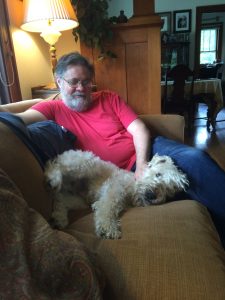I love to teach. I guess that is a good thing, since I am a rabbi and rabbi means teacher. While that is true, it doesn’t quite get to the heart of it. I love watching students “get it.” The look of delight on their eyes when they solve a puzzle, that’s what brings me joy.
The Hebrew for learn is lilmod. The Hebrew to teach is l’lamed. They are related words, with the same root. Lamed-Mem-Dalet. Because basically they are the flip of the same coin. In one of our prayers, Ahavah Rabbah we actually use both roots.
Ham’racheim, racheim aleinu,
v’tein b’libeinu l’havin ul’haskil, lishmo-a,
lilmod ul’lameid…
O Merciful One, have mercy on us
by making us able to understand and discern, to heed,
learn, and teach…
This is a prayer that tells us that G-d loves us like a parent because G-d gave us the Torah, a system of rules, just like parents set limits on kids. G-d taught us the Torah and so we learn it and then teach it to our children and grandchildren, to our students.
I remember learning how to be a swimming teacher. Standing on that dock learning how to break down the crawl stroke into manageable bits, component parts. Practicing, practicing, practicing under the hot, summer sun. First on land, then in the water. Teaching each other rhythmic breathing. Then teaching the kids. But when those kids got it, it was magical!
Good teaching requires patience, knowledge and good humor. It requires meeting each student where they are. It requires listening.
Recently I asked some students a question I didn’t know the answer to. During the High Holidays we chant the 13 Attributes of the Divine. Over and over again. This was my Bat Mitzvah portion. The reason I became a rabbi. The portion I wrote a thesis and then a book about. But I had never thought about this question. Why do we chant it three times in front of the open ark?
This is what the kids told us: We want G-d to pay attention. We are begging G-d. Three times means it is more important. For emphasis. There are three different types of sin. Three is a magic, lucky number. We get closer to G-d like when we rise up three times on our toes for Kedusha or take three steps forward before the Amidah.
The rabbis of the Talmud had it right. “R. Chanina said, “I have learned much from my teachers, more from my colleagues, and the most from my students” (Ta’anis 7a).
It was a WOW moment. And it brought me joy.
